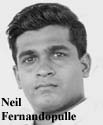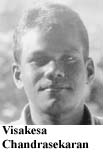
17th September 2000
News/Comment|
Editorial/Opinion| Business| Sports|
Sports Plus| Mirror Magazine

Writers, awards and a launch
By Alfreda de Silva
As I write this piece some lines by the poet Linda Hogan run through my mind."When we enter the unknown of our houses,
go inside the given up dark and sheltering walls, alone,
..... There's no more north and south.
Asleep, we pass through one another
like blowing snow,
all of us,
all."
 It
is this mysterious and priceless gift of the writer, the ability to grasp
and hold and tell the world about that transience of 'passing through'
that won the coveted Gratiaen Award jointly for Visakesa Chandrasekeran
and Neil Fernandopulle in 1999.
It
is this mysterious and priceless gift of the writer, the ability to grasp
and hold and tell the world about that transience of 'passing through'
that won the coveted Gratiaen Award jointly for Visakesa Chandrasekeran
and Neil Fernandopulle in 1999.
 Their
winning books, Visakesa's Forbidden Area, translated from his original
Sinhala version by the author himself, and Neil's collection of short stories,
sharp incisive pieces aptly called Shrapnel with its strongly allied concerns
were launched on September 5 at the British Council.
Their
winning books, Visakesa's Forbidden Area, translated from his original
Sinhala version by the author himself, and Neil's collection of short stories,
sharp incisive pieces aptly called Shrapnel with its strongly allied concerns
were launched on September 5 at the British Council.
They were introduced by Punyakante Wijenaike, herself a former Gratiaen winner and Neloufer de Mel who discussed their work. Neil, the scientist who does DNA typing for forensic cases, delights in writing and involves himself with drama and acting as a diversion from science while Visakesa, the Human Rights lawyer sees his writing as a continuation of his work. Like Neil, he cherishes his artistic activities of writing plays and stories and play-acting to which he adds Bharatha Natyam dancing. Forbidden Area poignantly highlights the vulnerability and humanity of a young suicide bomber.
As the chairman of the Gratiaen Trust, Godfrey Goonetilleke pointed out the recent opening of the competition for the submission of manuscript instead of already published material as had been done earlier had motivated a good response. The stipulation that winning entries should be published had been adhered to in all cases except one.
It all began with Michael Ondaatje the Booker Prize winner of the English Patient whose generous donation to set up the award in honour of his mother, Doris Gratiaen had been so exciting for writers here.
Small groups of them have been motivated to organize creative writing activities, which they share with a lot of enjoyment. One of these is the Writers' Workshop, which sprang into action in 1995, with a dedicated band of aspiring and practising writers.
They have been guided, at their request, by 'supervisors' like Anne Ranasinghe, Punyakante Wijenaike, Kamala Wijeratne, Sita Kulatunga, Haig Karunaratne, Christine Wilson and Pauline Hensman.
They meet for about four hours on the last Saturday of every month at the Beach Wadiya, a place as bohemian and arty, as they come. Of course the waves provide their own rhythm and song as accompaniment so do the rattle and toot of the trains but they all add to the fun.
The group consists of about 25 people with a constant of around 12 who discuss their poems, short stories, essays or whatever else they write on set themes or those of their own choice.
They have found the exercise enormously valuable and enjoyable, and are proud of the fact that Neil Fernandopulle, a member, was a joint winner of the 1999 Gratiaen. In 1988 there were two of the group on the Gratiaen short list - Premini Amerasinghe and Fahima Rizvan.
Anthea Senaratne was shortlisted for the Commonwealth B.C. short story competition and Nafeesa Tahirally and Lilamani Ebell won Channels literary awards.
An extra Writers' Workshop meeting takes place mid-monthly in a member's home. I was happy that, finally I was able to accept their invitation to one of these.
It was a very pleasant afternoon in the home of Ranjini Ellepola. A welcome visitor was Emeritus Professor Yasmine Gooneratne. Anne Ranasinghe started the ball rolling with a tightly knit, expressive poem on a tortoise, whose presence served a serious human purpose, in its concluding lines. Nafeesa Tahirally read a short story. So did Anthea Senaratne whose story recounted a family episode. Haig Karunaratne had some interesting snatches from English compositions submitted to him at the Defence Academy, where he and a fellow member Mohan Wijesinghe teach. Neil Fernandopulle gave us glimpses from his book 'Shrapnel'.
It surely would have made Michael Ondaatje's heart glad had he been
there to see the truthful journeying on the road on which the Gratiaen
was launched.
In this new series, Madhubhashini Ratnayake looks at the challenges facing the teaching of English today
Why do we teach and what do we teach?
A highly successful na tional conference of English teachers marking the formation of SLELTA - Sri Lanka English Language Teachers Association - concluded on September 3.It brought together teachers in Sri Lanka, those from the region, as well as those from the 'centres' of English language teaching. The sharing of ideas, experiences and knowledge, marked Sri Lanka's entry into the global network of English language teachers. The Sunday Times will highlight some of the issues that were brought forward at this conference since English language teaching is a problematic issue in Sri Lanka today.
One disturbing element emerged at the panel discussion at the concluding session of the conference. This was the tone of complacency that had crept into the proceedings with many compliments being paid to the "very good English teachers" that we have in Sri Lanka.
Undoubtedly, there are many good and dedicated teachers but there is a danger in assuming that therefore, everything is fine in the area of English language teaching in this country. The reality shows us that it is not.
Being involved in teaching English as a second language at a university, I have often wondered what benefit twelve years of language teaching in schools has given the majority of students who enter university. I am also aware that the same question will be asked with regard to us when the students graduate and enter society and the job market.
Many complex issues face the English Language teacher in Sri Lanka today. They have their roots in the social, cultural, political, psychological and economical aspects of Sri Lankan society and require us to confront the realities the student has to experience and come up with some answers, however controversial they might be. It is only then that there will be any chance of improving teaching English as a second language in Sri Lanka.
One extremely sensitive issue is that of standards. Professor Ryhana Raheem and Dr. Hemamala Ratwatta of the Open University of Sri Lanka, speaking on 'Regional Variation in Student Proficiency and Its Implication for Language Planning', presented some research at the conference that was as disturbing as it was relevant.
This year, they had done an island-wide survey of language skills in all nine districts of Sri Lanka. They based their study on the performance of Open University students who had sat for the Entry Test to the Open University's General English programmes. In the year 2000, about 4000 new entrants sat for this test from all nine provinces.
Using statistical methods, 20 students were selected from each province for the study. The test involved questions on the knowledge of language - i.e. grammar, the mechanics of language, and fluency (as measured by the cloze test, a special language test) - as well as reading and writing abilities.
The results were startling. Though almost all provinces rated acceptable and fair marks on the knowledge of language, the Western Province scoring good results on this, all provinces failed the writing test and almost all failed the reading test too. Another curious factor apparent in this research was that different patterns emerged with regard to different skills in each districts. Some districts were good in some skills while others were not and vice versa.
The researchers then dealt on the issues that such findings raise. English language teachers in Sri Lanka, and society in general have accepted one standard for all students. Common norms of competence exist by which everyone is judged, both at educational institutions and in society. The researchers concentrated on the one aspect that could be changed - that within institutions - and raised the controversial question of whether insisting on uniform syllabi for all students was fair.
Professor Raheem used Hornberger's 1995 model to show how standardization can occur in two ways: through status planning - that is the administrative/official way - and corpus planning - dealing with linguistic choices and the language rights of people. She showed how the status of English has always been ambiguous and ambivalent in Sri Lanka.
English in Sri Lanka has travelled a course from official neglect, unofficial sanction and maintenance to a place of importance again. In the mid-50s, English changed from being the dominant language in Sri Lanka. English continued to be the language used for international purposes as well as for national needs.
While it was understandable that commercial firms and institutions that dealt with trade and tourism used English, what was significant was that areas which were more locally based - i.e. education and the legal system - also continued to use English, as for instance in the faculties of Science and Medicine of the University system. Thus English continued to be unofficially maintained within the country which may have helped to pave the way back to official recognition.
This is what Professor Tiru Kandiah calls "Invisible Planning". English was made a link language in 1987. In 1995, English was proclaimed a national language, perhaps the complex tensions and forces within the Sri Lankan polity demanding that such recognition be given."
English now being regarded as 'a panacea for all ills' as Professor Raheem says, regional variation in language proficiency, as their study shows, should be considered seriously. She and Dr. Ratwatte question whether standadization should be imposed by administrative fiat or whether it should result from prevailing linguistic practices? They conclude that teachers must be involved in this activity. "We should question what standard should we teach and why?" The issue, they emphasise, needs careful study and research.
Next week - The new Advanced Level Syllabus for General English








![]()
Front Page| News/Comment| Editorial/Opinion| Plus| Business| Sports| Sports Plus| Mirror Magazine
Please send your comments and suggestions on this web site to

